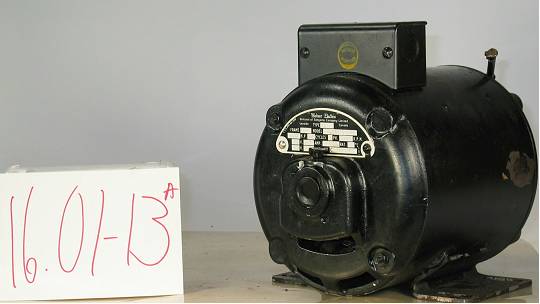Electric Motors – Single Phase, Repulsion Induction and Repulsion Motors
A mid 20th century, classic 1/4 HP, repulsion induction motor with inherent overload protection and automatic reset, part of a rare set of three 25 cycle motors escaping frequency standardization in 1948. They define new standards of practice, telling many stories of the explosion of small commercial refrigeration applications, which were enabled in the 1940’s through 50’s, changing the lives of Canadians forever, Wagner, new and unused, Circa 1947. [see also ID# 306, 307]
Features:
– Inherent, overload protector with automatic reset
– State of the art, light weight, non-ferro magnetic, alloy end bells
Technical Significance:
– An artifact [artifacts] of Canadian history telling many stories of life and times, including Canadian technological innovation, dissemination and popularization of electro-motive technology::
1. Marking the immense engineering achievement in the development and wide spread application of elegant and affordable, FHP repulsion induction motor technology well before the mid 20th century, paradoxically on the eve of its gradual demise and replacement by capacitor start FHP technology [see code 16.02],
2. Representing a technological achievement that would define the standard of practice for small commercial refrigeration motor applications in the 1940’s through 50’s, prior to the popularization of capacitor start motor technology and the widespread adoption of embedded motor and compressor equipment for commercial applications, the hermetic refrigeration condensing unit,
3. The popularization of small commercial refrigeration applications, enabled by the Wagner Type KA, a growth market in Canada in the post W.W.II years through the 1960’s, including ice cream and frozen food cabinets and merchandizers, reach-in, unitary refrigerators, display cases and merchandizers for small food stores and confectioneries – enabling a veritable explosion of new food products and tastes for Canadians.
4. One of Canada’s truly remarkable, mega-engineering projects of the 20th century, frequency standardization in Ontario a massive, multi-million dollar undertaking affecting every corner and crevice of life in Ontario.
– Repulsion induction motor technology was above all a marvel of its time, a technology born of both science and the consumer market place, a classic formula for the innovation and diffusion of popular technology, throughout the balance of the 20th century and on in to the 21st. Scientifically, the work of Faraday and many others laid much of the theoretical foundations for electromagnetic devices, the marvel of the early 20th century [much in the same way digital devices became the marvel of the early years of the 21st]. The wonders made possible by alternating current energised, rotating magnetic fields and the electric and magnetic circuitry that made them possible would soon be exploited by those interested in their application in applied electro-motive technology, including Steinnmetz and others. [See References especially #I, 2, and 5]
– See also ID# 296
Industrial Significance:
– See also notes ID# 296


